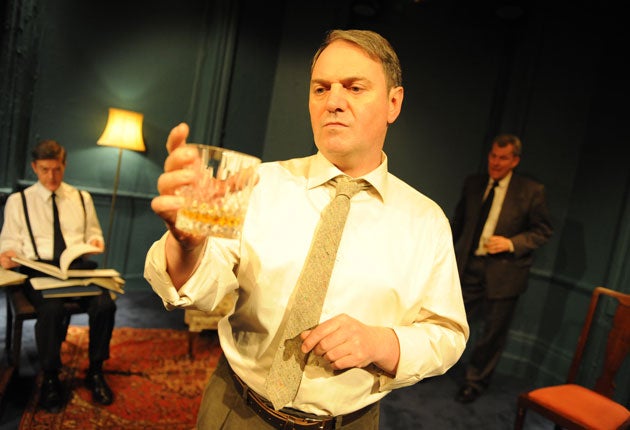The Potting Shed, Finborough Theatre, London
Greene rarity raises the spirits

Here's your starter for 10. What role was played in successive West End productions by John Gielgud and, uhm, Cliff Richard? I'm going to have to hurry you. Sorry time's up.
The answer is James Callifer, the estranged son in Graham Greene's 1958 drama The Potting Shed. This fascinating rarity, not seen in London since 1971, is now given a gripping, lucid revival by Svetlana Dimcovic.
Speaking as a scarred survivor of Sir Cliff's Heathcliff, I'm at a loss to imagine how he coped with the demands of playing Greene's complex, spiritually distraught fortysomething hero who is anguished by his inability to love and haunted by the loss of all his memories of life before a mystery illness when he was 14. His father, a once-renowned polemicist for atheism, lies dying but James, returning home unannounced, finds himself excluded from the deathbed by his chilly mother (Eileen Battye) who wants her husband to expire in peace. What has James done to deserve his long, maternally engineered ostracism? And, after decades of denial, will the Callifer clan, come clean about the fateful events, years ago, in the potting shed?
The play proceeds, for the most part, as a compelling spiritual detective story in which James – whose desperate need to get to the bottom of his aching sense of emptiness is very well conveyed by the subtly agitated Paul Cawley – is assisted in his investigations by an alarmingly pert precocious 13-year-old niece (strikingly portrayed by Zoe Thorne. Kenneth Tynan, reviewing the original production, treated the play to a sarcastic savaging: it's "not... a whodunit but a God-dunit", he declared to a piece that, to his mind "shot us back to the dark ages overnight". But The Daily Telegraph critic shrewdly noted that, by depicting a family of implacable rationalists in disarray at the irruption of the supernatural, Greene aimed to expose how "irreligious bigotry can be just as hard and narrow and cruel as the religious kind".
James is not the not only Callifer outcast. In the most moving scene of the piece, he tracks down his Uncle William (excellent Martin Wimbush), a despairing alcoholic husk of a Roman Catholic priest who lost his faith and goes through the motions of his ministry like a prisoner set deliberately pointless tasks. It seems that when the teenage James hanged himself in the potting shed, the priest brought him back from the dead by striking a deal with God in which he forfeited his beloved faith in return for the boy's life. The play wants you to credit that an actual miracle occurred, just as it wants up to entertain to the notion that a mother would go to the lengths of destroying her young son's happiness in the effort to cover up this divine disproof of atheism. The deeper question, though, that the play leaves under-explored, is how you could respect a deity prepared to enter into such a sordid bargain that creates so much collateral damage, not least the blighted life of James's ex-wife whom he excruciatingly re-woos once his born-again Christianity makes her, at last, fit to be loved. An unpalatable but deeply engrossing experience.
To 29 January (0844 847 1652)
Join our commenting forum
Join thought-provoking conversations, follow other Independent readers and see their replies
Comments
Bookmark popover
Removed from bookmarks